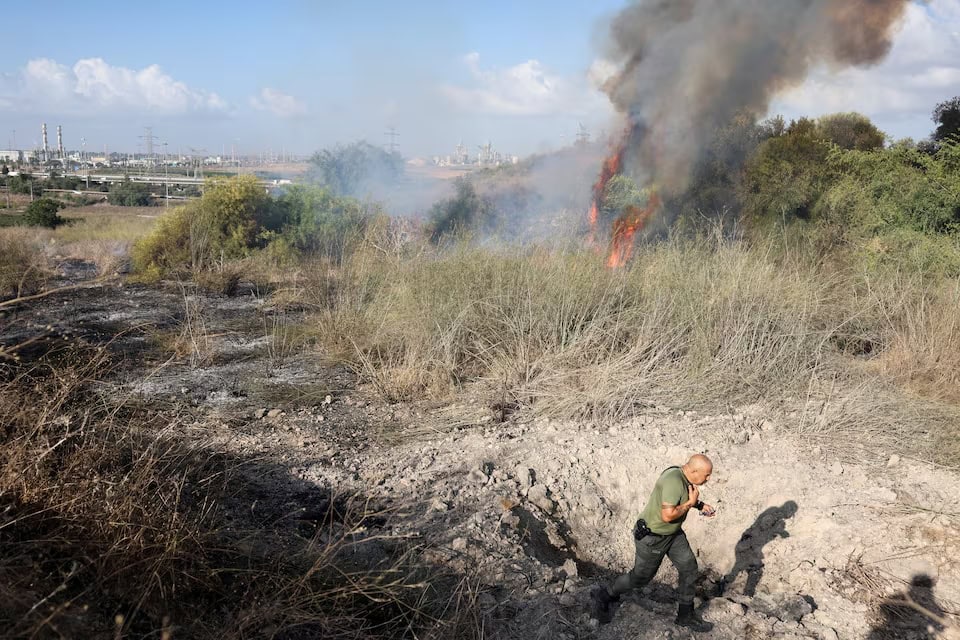
Smoke billows after a missile attack from Yemen in central Israel, September 15, 2024. (Reuters/Ronen Zvulun)
Last updated on: 15-09-2024 at 7 PM Aden Time
Aden (South24)
Israeli Prime Minister Benjamin Netanyahu has threatened the Houthis in Yemen with exacting a "heavy price" after the Iran-backed militia fired a ballistic missile that reached central Israel earlier this morning.
At the start of his cabinet meeting, Netanyahu said: "The Houthis fired a surface-to-surface missile from Yemen towards our territory. They should have known by now that we take a heavy price for any attempt to harm us. Anyone who needs a reminder in this matter is welcome to visit the port of Hodeidah. Anyone who attacks us will not escape from our arms.."
The threat came after the Houthis fired a ballistic missile that reached an unpopulated area in central Israel. Although there were no injuries, explosions were heard across the area, caused by Israel firing defensive missiles to intercept the attack.
The Israeli military said sirens sounded in Tel Aviv and other areas of central Israel at around 6:35 a.m. local time (0335 GMT), sending residents running to shelters, which led to minor injuries to nine people.
"A surface-to-surface missile was detected in the airspace towards central Israel, and impacted an open area without any injuries," the Israeli military added in a statement.
Simultaneously with the Houthi attack, the Israeli army announced the launch of 40 missiles from Lebanon towards northern Israel, some of which were intercepted while others fell in open areas without any reports of injuries.
Houthi military spokesman Yahya Sarea said in a press release on the X platform that they used a new hypersonic missile in the attack on Tel Aviv, which travelled a distance of 2,040 km in 11.5 minutes.
Sarea described the attack as a "qualitative military operation”. He said it comes "within the framework of the 5th stage" of escalation against Israel.
Sarea said that Israel should expect more attacks “and specific operations” as the first anniversary of the “blessed October 7 Operation” approaches, as well as a Houthi response to the July 20 Israeli air strike on the port of Hodeidah and the ongoing war in the Palestinian Gaza Strip.
Nasruddin Amer, deputy head of the Houthi media office, said in a post on the X platform that 20 Israeli interceptor missiles failed to shoot down the Houthi missile.
The attack is an unprecedented escalation by the Houthis, who have launched projectiles and drones toward Israel since the war in the Gaza Strip broke out in October.
However, most of the attacks were intercepted over Eilat on the Red Sea, while some hit open areas without significant damage.
On July 19, the Houthis launched a long-range drone that reached Tel Aviv, killing one person and wounding four others.
This attack was the first of its kind to reach Tel Aviv by a drone, and Israel responded by launching intensive airstrikes on Houthi targets near the port of Hodeidah in Yemen.
The Israeli air strike caused major fires in the oil storage tanks in the port, besides killing six people and wounding more than 80, according to the Houthi-run health ministry in Sanaa.
The July attack was also the first Houthi missile attack deep inside Israel.
The recent Houthi attack on Israel coincided with nighttime clashes between the militia and the Southern forces affiliated with the Southern Transitional Council in Al-Dhalea Governorate, north of Aden.
The clashes led to the killing of the field commander of the Southern forces, Lieutenant Colonel Mohammed Al-Hamidi, on the Bab Ghalaq front north of the governorate, according to what was reported by the South24 correspondent.
#BREAKING
— South24 | English (@South24E) September 15, 2024
Our correspondent: Col. Mohammed Al-Hamidi, commander of the Bab Ghalaq front was killed during violent clashes with the #Houthis #south24 pic.twitter.com/JGbhMETGpc
For days, the Houthis have launched several attacks against the Southern forces in Lahj and Al-Dhalea, threatening the state of calm that the country is experiencing and ringing the alarm bells of war.
South24 Center
Previous article